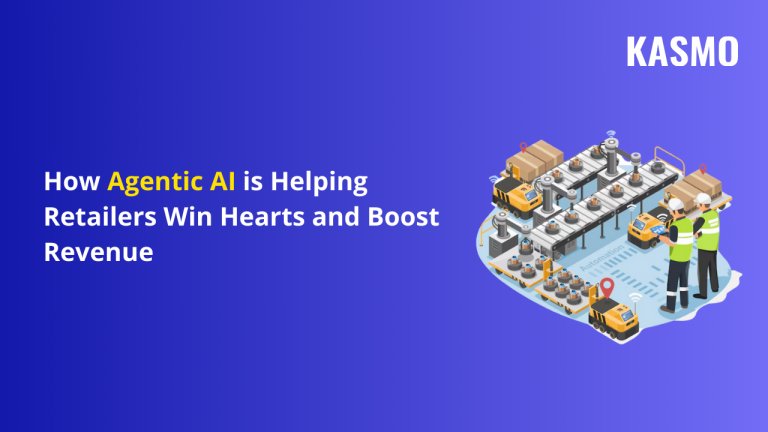The retail environment is changing faster than ever; it is shifting from the traditional approach and thinking about how to create smarter, faster, and valuable customer experiences. Retailers are fundamentally altering their business strategies and consumers’ interactions, whether it is through predictive personalization, omnichannel convenience, or intelligent real-time experiences. They can make use of digital advancements, AI, and data-informed experiences to create smarter experiences.
Salesforce AI Agent statistics for 2025 say 37% of consumers are already comfortable with AI agents creating more personalized/useful content for them.
AI Agents are autonomous systems or intelligent systems that can make recommendations or take actions to achieve goals, are capable of processing multiple inputs from a dynamic environment, and can even solve multi-step tasks. Many of the tasks that previously took minutes, hours, or days to accomplish can be performed accurately at a scale, for a fraction of the cost in seconds or minutes.
And guess what? Your competitors are already doing this. Large retailers are deploying AI agent systems, paving the way to transform the way retail operates, manage inventory, and consumer experience.
What is agentic AI in Retail?
Agentic AI combines advancements in Artificial Intelligence, like large language models (LLMs), with machine learning and enterprise automation to create autonomous AI agents. This agentic AI can analyze data, set goals, and create specific strategies to achieve those goals without human intervention. It works more than just prediction and analysis; it initiates strategic actions toward goals without constant human direction.
In retail, Agentic AI functions as its own digital worker with many advantages, including the ability to:
Integrate numerous platforms effortlessly
Leverage different tools, systems, and data sources
Consolidate complex sequences of actions without human action
For example, while a standard AI chatbot can answer a customer question using pre-determined rules, agentic AI in retail can identify and resolve problems, interact with inventory systems, initiate refunds, and reach out to customers with personalized offers and actions.

Benefits of Agentic AI in Retail
Agentic AI offers several benefits for retail businesses, some of the major ones are:
Enhanced Customer Service
While customer service is a critical element of retail. Agentic AI is automated and helps retail centers that can answer common questions, provide tracking on orders, and solve customers’ problems.
85% of customer service reps at organizations that use AI say it saves them time. With Agentic AI, you can assist anywhere without waiting for a staff member to engage. This allows store-based teams to spend their time dealing with more complex issues and providing personal support to clients.
Hyper-Personalization
Agentic retail AI allows personalization and more flexible systems that continuously learn and adjust at an individual level. These systems will review purchase behavior, browsing history, test personalized approaches, and adjust when customer behavior changes. An AI agent can even provide recommendations and offers to customers based on their in-store purchases and loyalty status.
Inventory and Supply Chain Management
Dealing with inventory is always a tough task. Lack of real-time inventory tracking across stores and warehouses can cause inefficiencies and delayed replenishment. Agentic AI for retail automation addresses this by analyzing buying trends, forecasting product demand, and guiding staff on optimal stock replenishment. By automating order management, inventory allocation, and logistics planning, Agentic AI streamlines operations, increases efficiency, and saves time.
Insightful Decision Making
Retailers often face challenges in making timely decisions due to fragmented data and poor data-driven analytics. Using agentic AI helps to make more informed decisions and implement data-driven actions. From analyzing market trends to forecasting product demand, it enables teams to make faster, insightful decisions, which helps in reducing decision-making time from days to minutes.
Smarter Merchandising
AI agents continually compare a product to other similar products that are already present in the market to understand the performance of new items. This is where AI-powered merchandising comes into play. Using real-time data and analyzing trends, AI-powered merchandising helps retailers make informed decisions and enhance business performance.
Store Operations Optimization
Physical stores are entering a new paradigm shift as Agentic AI systems learn and optimize all the operational parameters related to staffing, coordinate staff scheduling, inventory positioning, and demand for specific products. This helps retailers make a strategic move to drive higher sales and revenue.
Challenges and Considerations for Agentic AI in Retail
While implementing Agentic AI into the legacy system, retailers face certain challenges, like-
Organizational Readiness
Implementing Agentic AI in the organization does not just include technical aspects—it’s a cultural transformation. Store staff, inventory managers, and merchandising teams need to adapt to new work models and update their skills to collaborate with AI technologies. Retailers must support this transition to ensure smooth adoption.
Ethical Governance
Accountability becomes more complicated when AI behaves autonomously. What happens if an algorithm for pricing is discriminatory, or an AI agent makes the wrong support choice? Retailers should have a governance framework outlining the ethical guidelines for AI.
Human and AI Balance
AI systems enhance efficiency, but the human element remains essential. The customer might prefer to speak to an assistant, or an issue may need a human intervention to provide a better resolution and enhance customer experience. Retail businesses can use Agentic AI to enhance employee performance, rather than replacing them.
Cost Barriers
The implementation cost for new technology can be very high. While Agentic AI in retail will save costs and accomplish a better result in the long run, retailers should bear the initial investment, which also requires necessary planning and support.
Effective Role of Salesforce Agentic AI- Agentforce in Retail Success
Agentforce for Retail is a proactive AI application that works as a digital labor along with humans to increase productivity and efficiency for a retail business. It focuses on providing expertise and continuous support to your staff by leveraging language models (LLMs) and reliable data to analyze customer behavior to offer more personalized shopping experiences.
Resolves Customer inquiries 24/7
Agentforce engages your customers autonomously across channels using natural language and trusted customer data. It can resolve queries and customer concerns at a higher speed with accuracy. Agents operate 24/7, providing consistent and timely support on different platforms like self-service portals and messaging channels. Retailers can seamlessly integrate Agentforce with the Salesforce Service Cloud. Businesses can define pre-built guidelines for agents on when to escalate queries to human agents to ensure they are resolved efficiently.
Personalized Recommendations
Agentforce helps retailers connect and build a personal connection with consumers. Salesforce AI agent to analyze real-time data and understand customer behavior to provide more relevant and personalized product suggestions across channels. It also provides interactive and personalized conversations with customers through the messaging app of their choice. This ultimately improves engagement, increases revenue, and ensures greater customer satisfaction.
Efficiently Optimize Marketing Campaigns
Agentforce can enable marketing teams to promote effective marketing campaigns with greater speed. Marketers can leverage Agentforce to reduce the number of hours spent on developing a campaign brief, identifying and segmenting customers, analyzing their purchase history, and even tracking their customer journey. Using this data and AI agents, retailers can better optimize their campaigns across email, social media, and search ads. Agentforce monitors ad performance against KPI’s and automates multi-channel campaign execution.
Conclusion
Agentic AI is transforming the way the retail sector operates, manages value chain, and provides customer experience. It is automating tasks from store management and marketing to data analysis and customer service. Retailers leveraging agentic AI are building the foundation for long-term customer loyalty and are ahead of the competition.
Salesforce’s Agentforce helps retail businesses with autonomous, AI-powered agents that can provide personalized support for customers and employees across marketing, merchandising, supply chain, and store operations. Agentforce enables retail businesses to automate order management, tailored recommendations, and guide shopping experiences.





